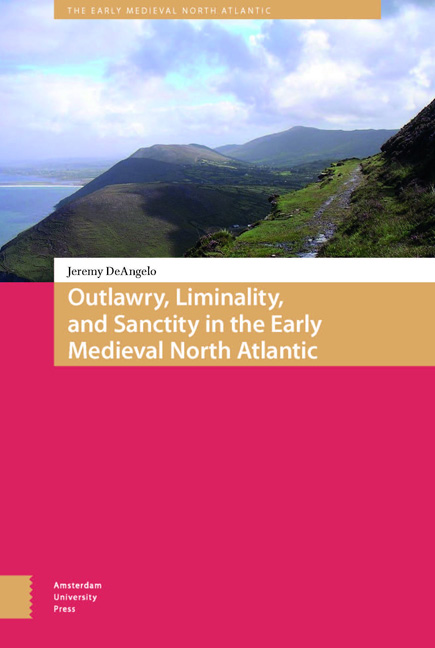Book contents
- Frontmatter
- Dedication
- Contents
- Acknowledgements
- Introduction: The Hermit and the Outlaw
- 1 Outlawry and Liminality in the North Atlantic
- 2 Imitating Exile in Early Medieval Ireland
- 3 Lessons of Conduct in Anglo-Saxon England
- 4 The Transgressive Hero
- 5 Cultural Exchange at the Boundaries of the Far North
- 6 Transgression in Transition after the Norman Conquest
- Bibliography
- Index
3 - Lessons of Conduct in Anglo-Saxon England
Published online by Cambridge University Press: 16 February 2021
- Frontmatter
- Dedication
- Contents
- Acknowledgements
- Introduction: The Hermit and the Outlaw
- 1 Outlawry and Liminality in the North Atlantic
- 2 Imitating Exile in Early Medieval Ireland
- 3 Lessons of Conduct in Anglo-Saxon England
- 4 The Transgressive Hero
- 5 Cultural Exchange at the Boundaries of the Far North
- 6 Transgression in Transition after the Norman Conquest
- Bibliography
- Index
Summary
Irish Conduct in Anglo-Saxon England?
A modest yet dangerous expedition is undertaken in the third chapter of Bede's Vita sancti Cuthberti, when several monks from a community on the south bank of the Tyne leave the monastery to forage for timber. On the return journey, carrying their provisions on rafts, they position themselves on the opposite bank and attempt to cross, only to find themselves blown by a sudden squall towards the river mouth. A rescue force dispatched soon finds itself in the same straits, and the monks are left drifting out into the open sea with nothing but their own prayers and those of their brethren on shore to save them. Yet there are other observers of this crisis, ‘uulgaris turba non modica’ (‘a mob of common people of no small size’), who quickly conclude that they are already witnessing divine intervention in action:
[C]oepit irridere uitam conuersationis eorum, quasi merito talia paterentur, qui communia mortalium iura spernentes, noua et ignota darent statuta uiuendi […] Nullus inquiunt hominum pro eis roget nullius eorum misereatur Deus, qui et ueteres culturas hominibus tulere, et nouas qualiter obseruare debeant nemo nouit.
They proceeded to mock their [the monks’] method of living (uitam conuersationis), as if they were suffering so deservedly (merito), those who spurned the common laws of mortals and offered new and unfamiliar rules for living […] [The commoners said,] ‘May no one pray on behalf of them, nor ask God to pity any one of them! They rob men of their ancient customs (ueteres culturas) and no one knows how they are supposed to observe the new ways’.
It is somewhat unclear as to what the veteres culturae are which the crowd on the shore claims the monks have abolished. The laypeople may be stubborn heathens, or they may be partisans in the ecclesiastical conflicts which roiled Britain in Bede's and Cuthbert's days. In either case, in their interpretation of the events which unfold before them and in the characterization of the perceived crimes of the monks, they express belief in the concept of conduct such as was outlined in the Irish immrama.
- Type
- Chapter
- Information
- Publisher: Amsterdam University PressPrint publication year: 2018



